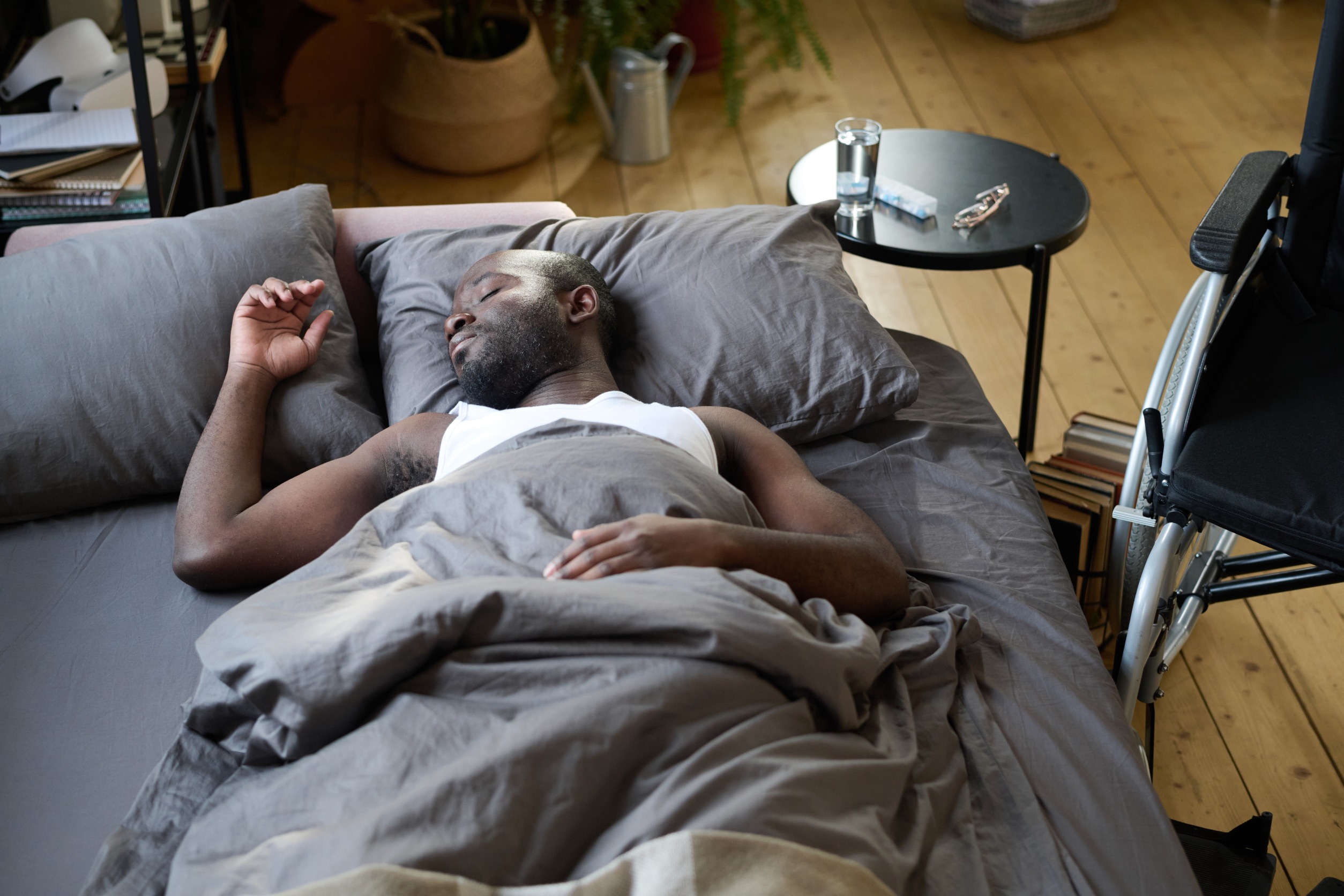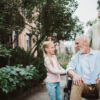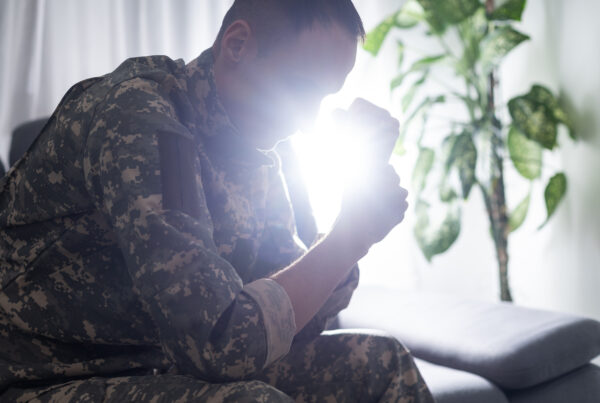”Question: Disabilities impact my sleep. Are there any tips that would help my loved ones and me?
Reading Time: 8 Minutes
MWi Hack:
- Learn how disabilities affect sleep, and how to overcome these challenges as a patient and a caregiver.
MWi Summary:
-
- Disabilities, both physical and intellectual, have been shown to negatively affect sleep.
- Research also shows the majority of caregivers’ sleep quality suffers when caring for someone with a disability.
- Some simple changes that can improve the sleep of caregivers and persons with disabilities include avoiding screen time before bed, limiting caffeine, and sleeping in a cool dark room.
If you are a person with a physical or intellectual disability, chances are the condition affects your sleep. The same thing goes for anyone who’s responsible for caring for a person who’s living with a disability.
Of course, every person and every condition is different, so it’s difficult to predict if and how a condition will affect someone’s sleep. But as a general rule, research shows that people living with disabilities are more likely to suffer from sleep problems than people who are not living with disabilities.
This piece will cover the research on intellectual disabilities, physical disabilities, and sleep in both adults and children. It will also investigate the link between autism and sleep problems and address some of the sleep-related challenges that caregivers may face. Finally, we’ll cover some sound strategies for addressing sleep issues linked to disabilities.
Links Between Sleep Problems And Disabilities In Adults
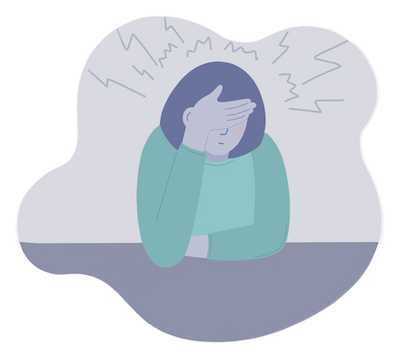 According to the University of Washington Rehabilitation Research & Training Center (RRTC), 40% of adults with disabilities report experiencing long-term sleep difficulties.
According to the University of Washington Rehabilitation Research & Training Center (RRTC), 40% of adults with disabilities report experiencing long-term sleep difficulties.
Common sleep disorders within this population include insomnia, excessive daytime sleepiness, and narcolepsy (falling asleep very suddenly during the day).
Research also suggests that adults with disabilities are not getting enough sleep.
Data from the 2014 Behavioral Risk Factor Surveillance System (BRFSS) examined the sleep habits of adults with and without disabilities in Oregon. According to a report from the Oregon Health & Science University, 44.8% of Oregon adults with disabilities said they got less than 6 hours of sleep each night, compared to just 27.1% of Oregonians without a disability. And only 47.8% of Oregonians with disabilities got the recommended 7 to 9 hours of nightly sleep, compared to 70.7% of Oregonians living without a disability. “People with disabilities are at risk of not getting enough sleep,” the report concluded.
The same may be said for adults with intellectual disabilities, not just those with physical ones. A 2016 study published in the Journal of Intellectual Disability Research, which looked at the prevalence of sleep problems in adults with Down syndrome, found that many adults with Down syndrome also suffer from sleep apnea or sleep disturbances.
Caregivers And Sleep Deprivation
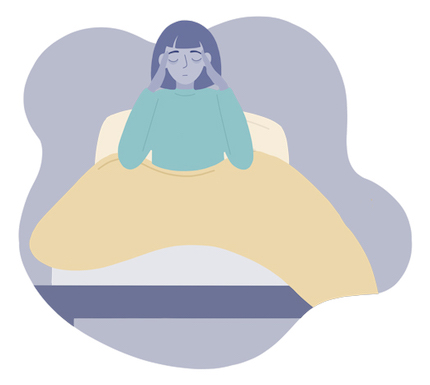
Many caregivers can experience caregiver burnout, with symptoms that include fatigue, depression, and insomnia.
According to the Child Mind Institute, parents and caregivers of children with disabilities may be more likely to experience anxiety, depression, insomnia, and fatigue.
One 2017 review of literature evaluated the sleeping habits of parents of children who rely on medical technology, such as feeding tubes, insulin pumps, oxygen masks, and ventilators. These caregivers got significantly less sleep than the caregivers of children without disabilities, and the researchers concluded that these caregivers were “at risk of acute and chronic sleep deprivation, psychological distress and impaired daytime function that may threaten their capacity for sustained caregiving.”
Other research from the Family Caregiving Alliance suggests that around 41% of caregivers say they are regularly woken up at night by the care receiver.
The Alliance strongly recommends that caregivers seek respite when they are able to do so. Options include seeking assistance from family and friends, hiring professional in-home assistance, or speaking to social workers about respite options in your area.
“Don’t wait until you are exhausted and overwhelmed,” the Family Caregiving Alliance says. “Respite is most effective if it’s used early and regularly. Even short breaks make a difference.”
Links Between Sleep Problems And Disabilities In Children
In an academic study published in a 2006 issue of the journal Physical & Occupational Therapy In Pediatrics, researchers examined the sleep habits of 178 children with physical disabilities such as cerebral palsy, spina bifida, and muscular dystrophy, as well as 69 children without physical disabilities. The children’s caregivers completed surveys about their children for the study.
According to this study, children with physical disabilities took an average of 37 minutes longer to fall asleep on weeknights compared to children without physical disabilities. Furthermore, children with disabilities were more likely to wake up multiple times during the night or need assistance moving positions during the night.
Many of the children in the study had used adaptive equipment at some point during their lives, mostly to “promote musculoskeletal alignment,” and many caregivers said this interrupted the children’s’ sleep or made them uncomfortable during the night. “Many caregivers were concerned about their child’s safety and comfort when sleeping and the negative effects of poor sleep patterns on their child’s general health and participation in daytime activities,” the researchers concluded. The study’s authors called for physicians and other health professionals to recognize sleep problems in children with disabilities and work together with families and caregivers to find sleep solutions.
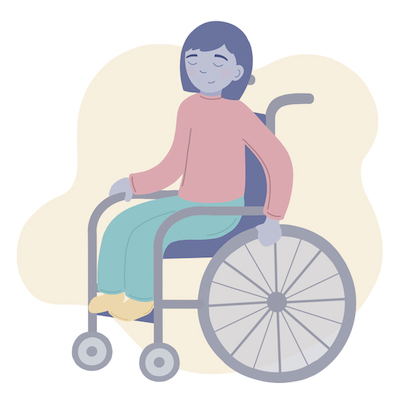
Another study, which was published in the March/April 2006 issue of Research in Developmental Disabilities, focused on children with an intellectual disability (ID) such as autism, Down syndrome, or Prader–Willi syndrome. “The prevalence of sleep problems in the disability groups was at least four times higher than for children [without disabilities],” the researchers found.
Common sleep issues in children with intellectual disabilities included trouble settling down at night, co-sleeping with a parent or caregiver, nocturnal incontinence, and waking up very early in the morning.
The parents interviewed in the study said that they worried about their children’s’ sleep issues because they affected the child, but also because the sleep issues could disturb other family members’ sleep at night.
Autism And Sleep
According to the Centers for Disease Control, around 1 in 59 children has autism spectrum disorder (ASD), defined as “a developmental disability that can cause significant social, communication and behavioral challenges.”
The University of Utah Health website estimates that around half of children affected by autism spectrum disorders (ASD) also have trouble sleeping — but the exact link between autism and sleep problems is not clear.
“One theory suggests a malfunction in the body’s circadian rhythm, which is the body’s 24-hour biological clock, and the inability to regulate the brain’s production of melatonin,” said Dr. Patricia Aguayo, an autism disorder specialist at the University of Utah Health. Common sleep issues in children and teenagers with ASD include trouble falling asleep and waking up often in the middle of the night.
If you have a child with ASD who also has sleep issues, the Autism Speaks website offers a number of suggestions. According to the site, the following things can help children with ASD sleep better:
- Following a regular bedtime routine, in the same order and at the same time every night
- Using a visual schedule that depicts each step of the bedtime routine, so the child can follow along with it
- Getting regular physical activity during the day
- Regular exposure to sunlight during the day and darkness during the night
- Keeping their bedroom cool, dark, and quiet to facilitate comfortable sleep
Common Sleep Disorders Or Syndromes
“Sleep is a complex process that involves many parts of the brain,” the University of Washington Rehabilitation Research & Training Center (RRTC) explains. “For this reason, and depending on a person’s specific disability as well as their general sleep habits, many different kinds of sleep disturbances can occur in persons aging with a disability.”
Here are some common sleep disorders that may affect people with disabilities, and what the symptoms look like.
Sleep Deprivation
Chronic sleep deprivation can lead to a number of health problems. According to Harvard Health, consistently not getting enough sleep is linked to:
- Obesity
- Heart disease
- High blood pressure
- Diabetes
- Mood disorders
- Alcohol overuse
“Data from three large cross-sectional epidemiological studies reveal that sleeping five hours or less per night increased mortality risk from all causes by roughly 15 percent,” the site explained.
Sleep Apnea
Sleep apnea is a condition where your breathing starts and stops while you are asleep. There are three separate types of sleep apnea:
- Obstructive sleep apnea, which is caused by muscles in your throat relaxing and blocking the airway
- Central sleep apnea, which is caused by your brain failing to send the right signals to the muscles that control breathing
- Complex sleep apnea (also known as treatment-emergent central sleep apnea) which is what happens when you suffer from both obstructive sleep apnea and central sleep apnea
Restless Legs Syndrome
According to Mayo Clinic, Restless Legs Syndrom (RLS) causes an “uncontrollable urge to move your legs, usually because of an uncomfortable sensation” and is also known as Willis-Ekbom Disease. According to the clinic, symptoms can look like any of the following:
- Sensations that occur after the body is at rest. Mayo Clinic says the symptoms usually happen after someone has been sitting still for a period of time, like in a car, on a plane, or at bedtime.
- Feeling relief through movement. People may find movements like stretching, jiggling, pacing or walking to help alleviate their RLS.
- Symptoms increase at the end of the day. The feelings attributed to RSL steadily increase at night.
- Twitching legs overnight. RLS is linked to a more common condition called periodic limb movement of sleep, which the clinic says causes the legs to twitch and kick, possibly throughout the night, while one sleeps.
Hypersomnia
Hypersomnia is either excessive time spent sleeping, or excessive feelings of daytime sleepiness. The University of Rochester Medical Center website says the following symptoms are indicative of hypersomnia if you experience them for three weeks or longer:
- Sleeping 10 hours or more each night
- Struggling to stay awake during the day even though you got a full night’s sleep
Tips For Sleeping Better With A Disability
Helpful advice on how to improve your sleep if you are living with a disability depends on both your condition and the sleep problem you’re having. For this reason, it’s always important to consult with your doctor.
If you have an intellectual disability or a physical disability and have the symptoms of a sleep disorder such as sleep apnea or restless leg syndrome, here are a few helpful tips:
- Speak with your physician, who can listen to your concerns and properly diagnose your condition
- Work on a treatment plan with your healthcare provider. Treatments for sleep disorders include lifestyle changes such as exercise, cutting out caffeine, following a strict sleep/wake routine, and practicing good sleep hygiene. In some cases, you may need to take medication, and in some rare cases sleep apnea is treated with surgery
Following a good sleep hygiene routine can be helpful for people with an intellectual or physical disability who are struggling to obtain high-quality sleep. Here are some recommended sleep hygiene habits:
- Going to bed at night and waking up in the morning at the same time every day, including on weekends
- Sleeping in a dark, quiet, and cool room. You can use blackout shades or curtains to keep out light or wear an eye mask. If street noise or noise from the rest of the house is a problem, try turning on a fan or using earplugs or a white noise machine to mask sounds
- Get the right mattress for your specific situation. For instance, if you struggle with back issues, there are mattresses to combat this (take a look at the best beds for back pain). Make sure you have a mattress that is properly comfortable and supportive. If you sleeping on the best mattress for you, this will be very helpful.
- Avoid using electronics before bed. The blue light emitted by electronic screens can interfere with your body’s ability to fall asleep, so all screens should be put away at least one hour before bedtime
- If at all possible, avoid drinking caffeinated beverages in the late afternoon and evening
Therapy
The Penn Sleep Center at Penn Medicine recommends Cognitive Behavioral therapy (CBT-I) as the “first line of defense” in insomnia treatment. “There is a large scientific literature that shows that behavioral interventions are as effective as medication and, unlike medications, produce durable results that last after treatment is discontinued,” the website explains.
Natural Remedies
There are tons of natural remedies out there that people say really work to help them fall asleep and stay asleep at night. (Of course, it’s important to do your own research and consult with a medical professional to see what might work for you.) A few supplement options include:
- Melatonin. “Some research suggests that melatonin supplements might be helpful in treating sleep disorders, such as delayed sleep phase, and providing some relief from insomnia and jet lag,” the Mayo Clinic explains. Melatonin is generally safe for short-term use, but check with your doctor if you are taking any other medications to see if melatonin might interfere with those.
- Magnesium.
Harvard Health says the research on magnesium supplements and sleep is pretty thin, but there’s anecdotal evidence that taking magnesium supplements can help. Again, check with your doctor to make sure magnesium won’t interfere with other medications you are taking.
- Meditation. There’s a strong body of research suggesting that meditation can improve sleep quality and duration.
Sleeping Pills
“Prescription sleeping pills may help you fall asleep easier or stay asleep longer — or both,” the Mayo Clinic website explains. “The risks and benefits of various prescription sleeping pills can differ.”
For instance, some sleeping pills come with a risk of you becoming dependent on them, and there are a host of potential side effects including headaches, feeling dizzy or lightheaded, feeling nauseated, diarrhea, feeling extremely drowsy, increased risk of sleepwalking, and having problems with performance or memory during the daytime.
Experts agree that sleeping pills should be considered a last resort to combat insomnia.
Sleep Tips For Caregivers
Some caregivers know they aren’t sleeping enough, but others don’t actually realize they are sleep deprived. When you’re caring for a loved one, it’s easy to get so caught up in caretaking that you forgot to think about your own needs.
Research published in 2018 analyzed the sleep patterns of 43 caregivers for people with dementia and found that almost 92% of the caregivers slept poorly, woke up frequently, and slept less than six hours nightly.
Sleep deprivation can take a serious toll on caregivers (as it does on anyone!). Consistently not getting enough sleep can lead to trouble concentrating, mood swings, excessive tiredness, reduced physical or athletic performance, impaired cognitive performance, and a higher risk of developing serious health conditions, among other negative effects.
So how can caregivers increase their odds of obtaining the sleep they need while maintaining their responsibilities to the person in their care? Here are a few strategies:
- Track your sleep. Keeping a sleep diary or using a smartwatch to track sleep can help caregivers understand how much sleep they are getting and how often they are waking up at night. This information can help you determine whether you’re dealing with sleep disturbances or sleep deprivation, which is the first step toward addressing the issue.
- Practice good sleep hygiene. Just as healthy sleep hygiene habits can support sleep among people with disabilities, the same is true for caregivers. Maintaining consistent bed and wake times, establishing a soothing bedtime routine, keeping screens out of bed, and sleeping in a cool, dark, quiet, and comfortable environment can all increase the odds of obtaining quality sleep.
- Sneak in a daytime nap. If it’s not possible to obtain more sleep during the night, then consider squeezing in some sleep during the day. Taking a nap may be a helpful way to catch some extra Zzzs and wake up feeling a bit more refreshed.
- Aim to get regular exercise. Exercise is consistently linked with better sleep. It’s also a great way to relieve stress and manage anxiety and depression, conditions that are common among caregivers.
- Minimize substance use.
If you’re stressed out by caretaking, it’s understandable that substances such as alcohol or cigarettes might become more tempting. But both alcohol and cigarettes have been shown to interfere with sleep, which means they aren’t effective approaches for self-care. If at all possible, ditch the cigarettes and opt for a nighttime cup of caffeine-free tea in lieu of alcohol.
- Seek some help. Caregiving is a massive responsibility, and it’s perfectly okay to ask for some help. If it’s financially possible, consider seeking overnight help from a medical professional so they can take over nighttime caregiving duties while you sleep. Or consider asking a friend or another family member to help out from time to time.
Every caregiver’s situation is different, and a caregiver struggling with sleep deprivation should speak to their doctor about potential ways to counter it.


